Brian Clegg's Blog, page 37
January 31, 2018
Forecasts aren't facts
 I regularly write about the fun to be found in probability and statistics - but also the difficulties we face in understanding them, because our brains don't seem to be wired in a way that adequately deals with this kind of mathematics. However, there's one misunderstanding that stands out heads and shoulders above the rest - and this is that we find it very difficult to distinguish between forecasts and facts.
I regularly write about the fun to be found in probability and statistics - but also the difficulties we face in understanding them, because our brains don't seem to be wired in a way that adequately deals with this kind of mathematics. However, there's one misunderstanding that stands out heads and shoulders above the rest - and this is that we find it very difficult to distinguish between forecasts and facts.Data about past events can be (though isn't necessarily) accurate. Data about the future is often only accurate if you are lucky. I'm not saying all forecasting is worthless - it's the best of a set of bad options (certainly better than relying on Mystic Meg) - but we always need to be aware of its limitations.
Let's take a simple personal example. My mortgage will soon be coming off a fixed rate, and the bank has kindly offered me a series of options for new fixed-rate details. To be able to decide between them, whether consciously or not, I have to do some forecasting. The choice came down to a two-year deal, fixed at a rate slightly better than I have at the moment, or a five-year deal fixed at a rate that is slightly worse than my current one. With my forecasting head on, I suspect that interest rates will rise significantly over a five-year period - and so I opted for the five-year deal. However, let's be clear about what I just did: I took a bet on what interest rates will do over the next five years. This is gambling just as much as taking a punt on a horse running in the 3pm at Doncaster. The probabilities may be different - but I don't know what's going to happen. All I can do is guess, based on the data I have, and place my bet.
This educated guessing applies just as much to the majority of decisions I may make about the future (financial or otherwise) - or, for that matter, to leaked Cabinet Office forecasts of the impact of Brexit or to a company's budget. The forecast isn't a fact, and when we make a decision based on it, we are taking a (hopefully calculated) gamble.
Let's finish of with that business favourite, comparing forecasts with actuals. I have witnessed many times anguished post-mortems where companies attempt to explain why what actually happened has differed from the budget or sales forecast, or whatever the prediction happens to be. They look for changes in the market, or the environment or their staffing... but what they hardly ever do is say 'Yep, the forecast was wrong, wasn't it?' Admittedly, incorrect forecasts aren't always the reason for a deviation. It can be due to those external factors. But I suspect poor forecasting is to blame in many of the cases where an organisation spends many person-hours trying to unpick what went wrong operationally.
I'm not suggesting you should shoot the messenger, or, in this case, the forecaster. Because we are dealing in probabilities and, yes, guesses, they will go wrong. Equally the forecaster may have biasses themselves - because there are usually a huge amount of assumptions in making a forecast. Rather, when we hear a forecast, it's essential to get a better idea of the probabilities involved (if known), the accuracy of the data and, crucially, the assumptions that are being made. Only then can we make sensible use of a statistical crystal ball. If that information isn't available, don't give the forecast the time of day.
Published on January 31, 2018 06:20
I regularly write about the fun to be found in probabilit...
 I regularly write about the fun to be found in probability and statistics - but also the difficulties we face in understanding them, because our brains don't seem to be wired in a way that adequately deals with this kind of mathematics. However, there's one misunderstanding that stands out heads and shoulders above the rest - and this is that we find it very difficult to distinguish between forecasts and facts.
I regularly write about the fun to be found in probability and statistics - but also the difficulties we face in understanding them, because our brains don't seem to be wired in a way that adequately deals with this kind of mathematics. However, there's one misunderstanding that stands out heads and shoulders above the rest - and this is that we find it very difficult to distinguish between forecasts and facts.Data about past events can be (though isn't necessarily) accurate. Data about the future is often only accurate if you are lucky. I'm not saying all forecasting is worthless - it's the best of a set of bad options (certainly better than relying on Mystic Meg) - but we always need to be aware of its limitations.
Let's take a simple personal example. My mortgage will soon be coming off a fixed rate, and the bank has kindly offered me a series of options for new fixed-rate details. To be able to decide between them, whether consciously or not, I have to do some forecasting. The choice came down to a two-year deal, fixed at a rate slightly better than I have at the moment, or a five-year deal fixed at a rate that is slightly worse than my current one. With my forecasting head on, I suspect that interest rates will rise significantly over a five-year period - and so I opted for the five-year deal. However, let's be clear about what I just did: I took a bet on what interest rates will do over the next five years. This is gambling just as much as taking a punt on a horse running in the 3pm at Doncaster. The probabilities may be different - but I don't know what's going to happen. All I can do is guess, based on the data I have, and place my bet.
This educated guessing applies just as much to the majority of decisions I may make about the future (financial or otherwise) - or, for that matter, to leaked Cabinet Office forecasts of the impact of Brexit or to a company's budget. The forecast isn't a fact, and when we make a decision based on it, we are taking a (hopefully calculated) gamble.
Let's finish of with that business favourite, comparing forecasts with actuals. I have witnessed many times anguished post-mortems where companies attempt to explain why what actually happened has differed from the budget or sales forecast, or whatever the prediction happens to be. They look for changes in the market, or the environment or their staffing... but what they hardly ever do is say 'Yep, the forecast was wrong, wasn't it?' Admittedly, incorrect forecasts aren't always the reason for a deviation. It can be due to those external factors. But I suspect poor forecasting is to blame in many of the cases where an organisation spends many person-hours trying to unpick what went wrong operationally.
I'm not suggesting you should shoot the messenger, or, in this case, the forecaster. Because we are dealing in probabilities and, yes, guesses, they will go wrong. Equally the forecaster may have biasses themselves - because there are usually a huge amount of assumptions in making a forecast. Rather, when we hear a forecast, it's essential to get a better idea of the probabilities involved (if known), the accuracy of the data and, crucially, the assumptions that are being made. Only then can we make sensible use of a statistical crystal ball. If that information isn't available, don't give the forecast the time of day.
Published on January 31, 2018 06:20
January 13, 2018
Review - Summer in the Islands
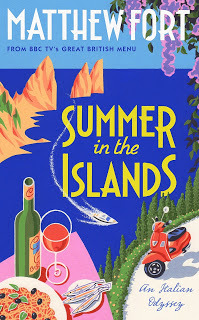 I can think of few better antidotes to a grey and miserable English winter than Matthew Fort's Summer in the Islands. It features a food writer and TV presenter in his sixties, setting off for six months of puttering around the Italian islands on a pink Vespa, obviously bringing us the eating highlights, but much more, the enjoyment of slowing down and simply living life in a series of fascinating landscapes, rather than the everyday battling through it back home.
I can think of few better antidotes to a grey and miserable English winter than Matthew Fort's Summer in the Islands. It features a food writer and TV presenter in his sixties, setting off for six months of puttering around the Italian islands on a pink Vespa, obviously bringing us the eating highlights, but much more, the enjoyment of slowing down and simply living life in a series of fascinating landscapes, rather than the everyday battling through it back home.In a puff on the back of the book, Jamie Oliver mentions the term 'midlife crisis'. Leaving aside any concerns about the definition of midlife, I'd say that Fort's adventures are the absolute antithesis of a midlife crisis. This isn't about showing off to your peers in an unsuitable sports car - it's about stepping into a different culture and gently absorbing and enjoying it.
The strange thing about the enjoyment of this book is that the reader does not need any sense of wanting to be in Fort's place. Any two-wheel transport fills me with horror, and the thought of negotiating Italian roads on a scooter would be a nightmare. I may love food, but have a very limited range with seafood, and inevitably on the islands there is very little else. And few of us share Fort's ability to find himself being invited out to dinner by complete strangers. But that doesn't matter. Because we can vicariously piggyback on Fort's enjoyment, wafted along on a Mediterranean breeze and lifted by his wonderful mix of erudite observations from history and literature and visceral interaction with his surroundings.
Something that comes through strongly is the difficult pull between commercial exploitation and the desperately needed cash that tourists bring. Acknowledging a degree of hypocrisy on his part, Fort can't help dislike the crowds on the beaches and the bland eateries that can spring up to support their gustatory needs - but at the same time admits that without the tourism there would be very little left on some of the islands. And he has to accept that, in the end, he too is a tourist. It's an old, old problem - but one that seems to be being played out particularly vividly on some of the islands.
From his exploration of a prison island to attending an opera where three different opera companies are at war with each other, to his final magnificent destination of Venice, Fort gives us a fresh-eyed view on Italy's beautiful fringes. His lifelong love of the country and expertise in food shines through - and so does a very human viewpoint. A book to treasure.
Summer in the Islands is available from Amazon.co.uk and Amazon.com
Published on January 13, 2018 03:03
December 30, 2017
Can you discover the periodic table?
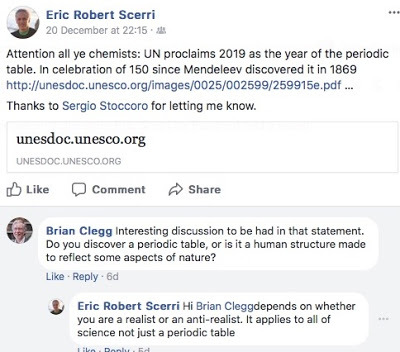 I follow the excellent historian and philosopher of chemistry Eric Scerri on Facebook and a recent post of his intrigued me.
I follow the excellent historian and philosopher of chemistry Eric Scerri on Facebook and a recent post of his intrigued me.In it, Eric uses the verb 'discovered' for what Mendeleev did with periodic table. When I queried this, he suggested that the use of the term depended on whether or not you are a realist. But I'm not sure if that's true.
Let's take a simpler example, then come back to the periodic table. Specifically, we'll use the star Betelgeuse, the distinctly red one of the four main stars of Orion.
If I'm a realist*, then I think there is something real out there that I am labelling Betelgeuse. In good Kantian fashion, I can't know the reality - the 'Ding and sich' - but I can report on the sensory data from Betelgeuse and believe that I am talking about something that really exists. As it exists independent of humanity, we can discover it. However, Betelgeuse is also a class M star on the endearingly random looking stellar classification system that goes from O to B, A, F, G, K, and M. This system is not part of the reality that is Betelgeuse, it is a classification system that people devised - it's a representation of something - a different class of thing to a star. As such, the classification system cannot be discovered: it has to be invented or created by human beings.
If I am a non-realist, who presumably doesn't thing there is a defined reality behind the label Betelgeuse, this has no effect on the constructed classification system, which is still invented or created.
Let's now shift that picture to Mendelev and the periodic table. As a realist I can accept that there are relationships between different atoms based on their atomic weights and properties - that is something that can be discovered. But like the stellar classification system, I would suggest that a periodic table is a representation, a model, not an aspect of reality. As such, even as a realist, I would suggest it can only be created or devised, not discovered.
* Note this is my interpretation of these terms - not everyone will necessarily agree
Published on December 30, 2017 03:47
December 24, 2017
Review - A Murder for Christmas
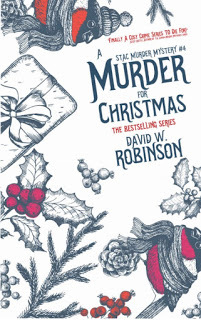 I finish my murderous Christmas roundup with a solid but unimaginative performer.
I finish my murderous Christmas roundup with a solid but unimaginative performer.I was wary of reading this as it's part of a long series featuring the 'Sanford Third Age Club', in this case on their Christmas jaunt to a hotel in Leeds, which all sounds a bit twee and forced. But in some ways it was better than my expectations.
Let's get the negatives out of the way first. The characters tend to have one or two simple characteristics that drive their behaviour. So, for example, our amateur detective and chairman of the Club, Joe Murray is obsessed with not spending money (he is a Yorkshireman after all) and is very observant. The writing style is workmanlike, but in some places the author forgets 'show, don't tell.' The police are pretty hopeless, apart from anything else in not arresting our amateur at the end after he withholds evidence for a day that he knows has been handled by the killer, loses part of it and handles all the rest repeatedly (admittedly with gloves). And the denouement, where in Agatha Christie style everyone but the dog is accused one after the other, drags on for far too long.
On the other hand, there are some interesting aspects to the plot, putting all involved in a hotel over Christmas, makes for good atmospherics and it genuinely is quite difficult to spot how the clues are going to be used to come to the satisfactory conclusion. What's more, the setting provides some nice observation of the second rate entertainment likely to be encountered on this kind of break. Oh, and there's only one murder - far too many detective mysteries have to have a string of them.
One other oddity is that this looks and feels like a self-published book, despite having an apparent publisher and being well edited. Certainly the author seems unfamiliar with mainstream publishing, as he puts one character on a book tour in the UK (which hardly ever happen) for a book which the character admits is an academic tome that will only sell a few copies. This is probably the strangest part of the story, and surely one the detective should have investigated further.
A Murder for Christmas is available from amazon.co.uk and amazon.com
... and if you too are still hunting, my murder mystery novel A Timely Confession is also a Christmas-set mystery.
Published on December 24, 2017 01:49
December 22, 2017
Review: Murder at the Old Vicarage
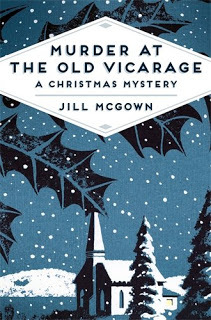 I'm still on my hunt for the ideal Christmas read for the murder mystery lover...
I'm still on my hunt for the ideal Christmas read for the murder mystery lover...Intriguingly, the presentation of this novel is both accurate and misleading at the same time - it's a quantum superposition of crime. On the one hand, the murder takes place in a vicarage (tick) at Christmas (tick) with lots of snow (tick). And there's no doubt that the title is a homage to Agatha Christie - in fact, the last line of the book is 'Murder at the Vicarage, he thought as he got into the car. He must read it again some time.' However, the setting apart, this is a modern murder mystery with mostly modern characters (I'll mention a couple of exceptions) and a thoroughly up-to-date Britain.
Jill McGown skilfully pulls together a plot in which every one of the possible suspects really could have done it - I've not read her books before, but I'll certainly be back for more. Her detectives, as is common these days, have domestic issues, not helped by them having previously had a relationship, but one is now married to someone else.
The characters are largely well drawn. Those two exceptions who come from the stock characters cupboard are an old lady who appears a little out of it, but is really a very sharp observer (who does that remind us of? Okay, I'm sure it's intentional) and the vicar, who harks back to the 70s when all vicars in fiction had to have lost their faith.
I didn't see the ending coming and found the book an engaging read. If I have one criticism of the plotting: almost everyone seemed at some point to be lying to cover up for another person who they thought had done it, but who hadn't. They never seem to bother to talk to each other and check.
The modern setting means this book doesn't quite score as well as it could for a traditional Christmas murder mystery... but it is well written and keeps the reader guessing, so it has turned out to be one of my favourites for this year.
Murder at the Old Vicarage is available from amazon.co.uk and amazon.com
... and if you too are still hunting, my murder mystery novel A Timely Confession is also a Christmas-set mystery.
Published on December 22, 2017 02:50
December 21, 2017
The Mistletoe Murder - review
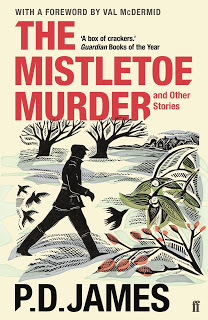 Still on my search for the perfect Christmas murder mystery, my next port of call is with one of the top names in the business, P. D. James.
Still on my search for the perfect Christmas murder mystery, my next port of call is with one of the top names in the business, P. D. James.You know when you get a book with just four short stories in at (admittedly relatively meaty ones) that it was intended as a gift book - but in the case of this collection of four Christmas-set P. D. James stories it is certainly a worthy addition to any list of seasonal favourites.
There is no doubt that James very deliberately sets out to push the boundaries, and though some of the stories have very traditional, Agatha Christie style country house and snow settings, there is a darker feel here. In two of the stories, she adopts the same approach that Jane Austen used in Northanger Abbey of stepping outside the fictional viewpoint to make knowing remarks on the format to the reader. So, for example, in The Twelve Clues of Christmas, she remarks that Adam Dalgleish felt he was 'involved in one of those Christmas short stories to provide a seasonal frisson for the readers of an upmarket weekly magazine' - this being a story James wrote... for an upmarket weekly magazine.
Despite this playfulness, these are stories with plenty of interest and effectiveness as mysteries. Two feature a young Adam Dalgleish, allowing us to get snapshots of the earlier career of her great detective. The plots are generally as satisfying as is possible in a short story and the twists and turns suitably unexpected. Like the Sherlock Holmes stories, these are long enough short stories to get enough in, without wasting too much effort on character building and scene setting.
My only real criticism is that I would have liked the book to be at least twice as long - but it certainly fits well as a useful addition to the Christmas reading pile.
The Mistletoe Murder is available from amazon.co.uk and amazon.com
... and if you're still hunting, my murder mystery novel A Timely Confession is also a Christmas-set mystery.
Published on December 21, 2017 04:57
December 15, 2017
Murder on Christmas Eve - review
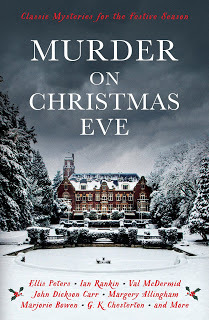 After my disastrous adventure of reading
Murder in the Snow
, I'm glad to report that I had a much better time with Murder on Christmas Eve.
After my disastrous adventure of reading
Murder in the Snow
, I'm glad to report that I had a much better time with Murder on Christmas Eve.This is a collection of Christmas murder mystery short stories. Generally speaking, murder mysteries don't do so well in short story form as, say, science fiction. It usually takes rather more page count to be a success in this genre, but this collection, from big names in the field, manages to do the job well. It's notable that the Father Brown story is probably the one that works as a pure murder mystery and is significantly longer than most of the others.
However, just because many of the others are quite short doesn't mean that they fail as stories, just that they tend to focus on a relatively small element of the 'how could that have happened?' nature and make it work very well indeed. The styles range from the modern touches of Ian Rankin and Val McDermid to a classic little Campion tale from Margery Allingham - but they're all (with one possible exception) well written, a delight to read and firmly set in the Christmas period.
If you're looking for some light Christmas bedtime reading with a criminal bent, this could be the one for you.
Murder on Christmas Eve is available from amazon.co.uk and amazon.com
Published on December 15, 2017 03:40
December 13, 2017
Light Saber Love Affair
 Image from
Wikipedia
Over the years many scientists and technologists have admitted that they were inspired to work in their field by Star Trek, but few, if any, would say the same about Star Wars. And yet the same individuals have an almost universal affection for the first trilogy of Star Wars movies. This is because, where Star Trek was solid science fiction, primarily influencing the head, Star Wars won the heart as an epic fantasy that comfortably wore the robe of 1930s pulp sci-fi. And nowhere is that more obvious than with the light saber.
Image from
Wikipedia
Over the years many scientists and technologists have admitted that they were inspired to work in their field by Star Trek, but few, if any, would say the same about Star Wars. And yet the same individuals have an almost universal affection for the first trilogy of Star Wars movies. This is because, where Star Trek was solid science fiction, primarily influencing the head, Star Wars won the heart as an epic fantasy that comfortably wore the robe of 1930s pulp sci-fi. And nowhere is that more obvious than with the light saber.Take a look at the technology of Star Trek and you’ll find a whole gallimaufry of items that have already made it to reality, or that are setting future directions. Our smartphones and tablets have left the TV show’s equivalents far behind. Even Siri is a better conversationalist than the Enterprise computer. And while we might not have warp drives or transporters, NASA is giving serious thought to ways of getting around the light speed limit, while quantum teleportation brings the transporter to life on an atomic scale. But the one really original technological development in Star Wars, the light saber, is the stuff of dreams, not of reality.
We want to use the technology from Star Trek. But can you imagine the reaction of the military if they were told that scientists had perfected a light saber and it was going to be issued as a sidearm? It would be difficult to be sure if they would laugh or cry. As a weapon, the light saber sucks. There’s a good reason why soldiers stopped using swords. They’re not much use against firearms that work from a distance. And though Star Wars creator George Lucas fudged the issue, showing Jedi masterfully stopping incoming blasts with flicks of their sabers, we all know that it just wouldn’t work. In reality, while they were busy stopping a blast to the head (which they couldn't actually do with projectile or energy weapons because of reaction time), another one would have taken them out from the rear.
Why, then, are light sabers so wonderful if we wouldn’t use them as weapons? Because we want to play with them. They are the ultimate toys. Take away the unpleasant effects of slicing through flesh and who wouldn’t want to take part in a light saber battle, clashing insubstantial glowing blade against blade to a sound track of that glorious ripping buzz? There’s a reason that there’s a toy light saber on my desk, rather than a Star Trek phaser. It’s more fun.
 Image from
Wikipedia
This doesn’t stop people who don’t understand science and science fiction getting it all wrong. In 2013, we saw headlines like “Scientists Finally Invent Real, Working Lightsabers” from Fox News. No, scientists didn’t. Not even close. The discovery referred to was fascinating – a mechanism for making two photons of light temporarily link together. But it was no light saber, and it never will be.
Image from
Wikipedia
This doesn’t stop people who don’t understand science and science fiction getting it all wrong. In 2013, we saw headlines like “Scientists Finally Invent Real, Working Lightsabers” from Fox News. No, scientists didn’t. Not even close. The discovery referred to was fascinating – a mechanism for making two photons of light temporarily link together. But it was no light saber, and it never will be.Part of the light saber’s charm is the way that it effortlessly breaks the laws of physics. It’s magic not math that makes the light saber work. So we shouldn’t look to Star Wars for technological marvels. But we should hope for movies that encourage us once more to dream of wielding the ultimate incandescent blade.
Published on December 13, 2017 02:00
December 12, 2017
Murder in the Snow - Review
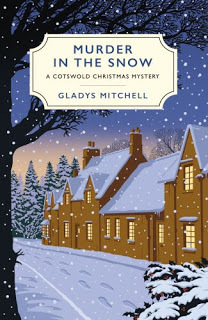 At Christmas I like to read a good murder mystery, particularly if it has a Christmas theme - I'd not come across Gladys Mitchell before, but I was encouraged by a quote from a Guardian review, likening it to Miss Marple. And the Cotswold setting was attractive, as it's just up the road from where I live.
At Christmas I like to read a good murder mystery, particularly if it has a Christmas theme - I'd not come across Gladys Mitchell before, but I was encouraged by a quote from a Guardian review, likening it to Miss Marple. And the Cotswold setting was attractive, as it's just up the road from where I live.I think I can sum up this book in one word: dire.
I can't find a single redeeming feature. Christmas hardly comes into it. The sole Cotswold aspect is mentions of Cirencester and Cheltenham plus a few Mummersetshire accents for the common folk (who are, of course, mostly half-witted). The writing is abysmal. I lost count of the number of times we were told the main character Mrs Bradley 'cackled' or 'leered' - I'm not sure the author knew what these words meant. Certainly they don't make her seem appealing. None of the characters ever becomes more than a cardboard cutout. The plot is poorly thought through, and for page after page everyone is convinced about who did it (there are very few suspects), but struggles to do anything about it. And then it turns out they did do it. The whole experience seemed far longer than it was.
Never again.
I'm not going to tell you how to buy this book - it's not even 'good' bad. It's just not worth reading.
Published on December 12, 2017 07:29



